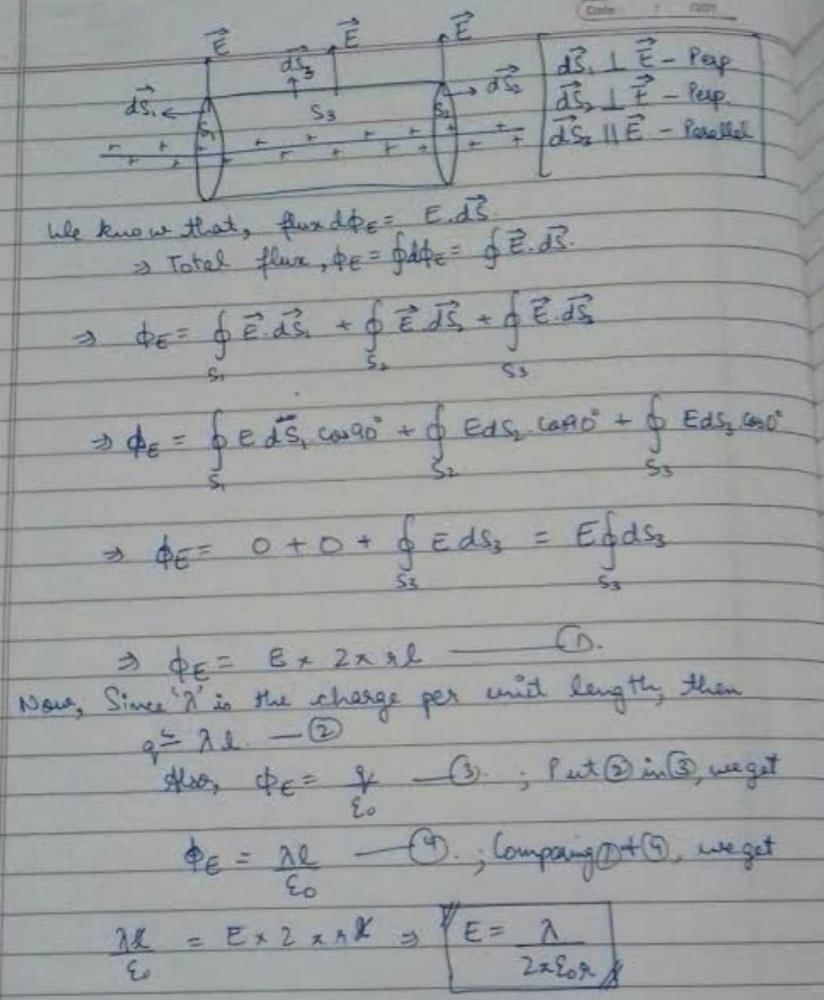Class 12 Exam > Class 12 Questions > Obtain an expression for the intensity of ele...
Start Learning for Free
Obtain an expression for the intensity of electric field due to an infinitely long, straight uniformly charged wire at a point near it using Gauss's law.?
Most Upvoted Answer
Obtain an expression for the intensity of electric field due to an inf...

Community Answer
Obtain an expression for the intensity of electric field due to an inf...
Electric field intensity due to an infinitely long, straight uniformly charged wire using Gauss's law
Gauss's law states that the electric flux through any closed surface is directly proportional to the charge enclosed within the surface. We can use this law to derive an expression for the electric field intensity due to an infinitely long, straight uniformly charged wire at a point near it.
Setting up the problem
Consider an infinitely long, straight wire with uniform charge density ρ. We want to find the electric field intensity at a point P located at a distance r from the wire.
Choosing a Gaussian surface
We choose a cylindrical Gaussian surface with radius r and length l, centered at the wire and passing through the point P. The surface area of this cylinder is given by:
A = 2πrl
Calculating the charge enclosed
The charge enclosed within the Gaussian surface is given by:
Qenc = ρAl
where A is the cross-sectional area of the wire and l is the length of the Gaussian surface.
Calculating the electric flux
The electric flux through the Gaussian surface is given by:
ΦE = E.A = EA
where E is the electric field intensity at point P and A is the surface area of the Gaussian surface.
Applying Gauss's law
According to Gauss's law, the electric flux through the Gaussian surface is equal to the charge enclosed within the surface divided by the permittivity of free space:
ΦE = Qenc / ε0
Substituting the values of ΦE and Qenc from the previous equations, we get:
EA = ρAl / ε0
Deriving the expression for the electric field intensity
Solving for E, we get:
E = ρ / (2πε0r)
This is the expression for the electric field intensity due to an infinitely long, straight uniformly charged wire at a point near it.
Conclusion
We can use Gauss's law to derive an expression for the electric field intensity due to an infinitely long, straight uniformly charged wire at a point near it. The expression is given by E = ρ / (2πε0r).

|
Explore Courses for Class 12 exam
|

|
Similar Class 12 Doubts
Obtain an expression for the intensity of electric field due to an infinitely long, straight uniformly charged wire at a point near it using Gauss's law.?
Question Description
Obtain an expression for the intensity of electric field due to an infinitely long, straight uniformly charged wire at a point near it using Gauss's law.? for Class 12 2024 is part of Class 12 preparation. The Question and answers have been prepared according to the Class 12 exam syllabus. Information about Obtain an expression for the intensity of electric field due to an infinitely long, straight uniformly charged wire at a point near it using Gauss's law.? covers all topics & solutions for Class 12 2024 Exam. Find important definitions, questions, meanings, examples, exercises and tests below for Obtain an expression for the intensity of electric field due to an infinitely long, straight uniformly charged wire at a point near it using Gauss's law.?.
Obtain an expression for the intensity of electric field due to an infinitely long, straight uniformly charged wire at a point near it using Gauss's law.? for Class 12 2024 is part of Class 12 preparation. The Question and answers have been prepared according to the Class 12 exam syllabus. Information about Obtain an expression for the intensity of electric field due to an infinitely long, straight uniformly charged wire at a point near it using Gauss's law.? covers all topics & solutions for Class 12 2024 Exam. Find important definitions, questions, meanings, examples, exercises and tests below for Obtain an expression for the intensity of electric field due to an infinitely long, straight uniformly charged wire at a point near it using Gauss's law.?.
Solutions for Obtain an expression for the intensity of electric field due to an infinitely long, straight uniformly charged wire at a point near it using Gauss's law.? in English & in Hindi are available as part of our courses for Class 12.
Download more important topics, notes, lectures and mock test series for Class 12 Exam by signing up for free.
Here you can find the meaning of Obtain an expression for the intensity of electric field due to an infinitely long, straight uniformly charged wire at a point near it using Gauss's law.? defined & explained in the simplest way possible. Besides giving the explanation of
Obtain an expression for the intensity of electric field due to an infinitely long, straight uniformly charged wire at a point near it using Gauss's law.?, a detailed solution for Obtain an expression for the intensity of electric field due to an infinitely long, straight uniformly charged wire at a point near it using Gauss's law.? has been provided alongside types of Obtain an expression for the intensity of electric field due to an infinitely long, straight uniformly charged wire at a point near it using Gauss's law.? theory, EduRev gives you an
ample number of questions to practice Obtain an expression for the intensity of electric field due to an infinitely long, straight uniformly charged wire at a point near it using Gauss's law.? tests, examples and also practice Class 12 tests.

|
Explore Courses for Class 12 exam
|

|
Signup for Free!
Signup to see your scores go up within 7 days! Learn & Practice with 1000+ FREE Notes, Videos & Tests.



















